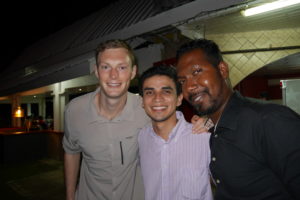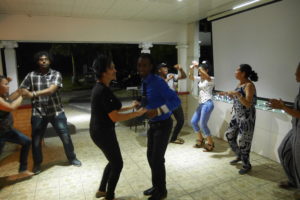
By Jarryl Bryan
Under the cool night breeze, the gathering crowd of laughing and chattering patrons at local bars could be mistaken for partygoers. But they have a more sober purpose. They are there at a “Spanglish Night” event, a fast-growing new initiative, to learn to speak a foreign language.
The organisers of the event are Guyanese education administrator Gordon Roberts; English anthropologist Charlie Tokeley and Chilean engineer Christian Vargas. These three may hail from different countries, but they are united in their desire to help Guyanese get more in tune with their South American side.
As such, they have been holding “Spanglish Nights” and “Language Lounges” at various entertainment venues on the first Wednesday of every month. Over drinks and ‘cutters’, curious Guyanese come together to network, practise and learn Spanish. It’s a method of immersion learning that’s as fun as it’s effective. Tokeley, who speaks English, Spanish and Portuguese, in fact, revealed that this method helped

his language learning.
“I found that learning Spanish, one of the greatest difficulties was confidence,” he explained in an interview. “I felt like I sounded silly, and this in turn meant that I spoke slower and made more errors. After a few drinks, however, I was pretty fluent!”
“”Spanglish” allows people to reach that point of confidence and, therefore, increase their second-language fluency, which in turn helps them improve further. It also helps people break down the cultural barriers that make it hard to speak a second language,” he added.
According to Tokeley, the more someone understands another culture, the easier it is to understand the language. Meanwhile, Vargas pointed out that contrary to the belief in a “grammar first” approach to language learning, the aim should be to talk to people first.
“Practising conversations – rather than learning from a book – makes a real difference,” Vargas explained.“Sometimes it’s hard to learn English because people can be impatient with you when you try. Finding people who are interested in your culture and willing to listen is a really important step in the process.”
Vargas, who speaks English and French as second languages, revealed that they have been partnering with other organisations like the Alliance Francaise and the Deaf Institute of Guyana (DAG).
He noted that for each “Spanglish” event, they would feature a different Spanish-speaking country. For instance, on Wednesday, July 11, Argentina was featured, with traditional drinks, food and music from that country also showcased. Nor does it end with foreign languages, as they are interested in including Indigenous languages.
“The Language Lounge will continue to incorporate more languages, and we would love to encourage a table for one of Guyana’s Indigenous languages so that we can spread awareness and education there, too.”
Background
In explaining the background of their enterprise, Roberts said that they initially planned the event as a gathering of friends and acquaintances who wanted to practise English and Spanish. He noted that they have several Cuban and Venezuelan friends, as well as Guyanese who are studying Spanish. But their plan was easier said than done.
“For our first event in March, we expected 10 to 15 participants, but nearly 50 people turned up! “Spanglish” has continued to grow since, with 80 plus participants at our last two events,” Roberts explained.
“Although there are Spanglish-type events in other countries, Spanglish Guyana was an original idea influenced by the desire to help Guyanese and foreign-language immigrants socialise together and learn more about one-another’s cultures. Our events centre around 15-minute periods, where the language changes from English to Spanish and back again each period.”
Besides the opportunities to network with persons of different cultures, Roberts pointed out the fact that the ability to speak Spanish and Portuguese would bring significant opportunities for Guyanese to do business and make money with neighbouring countries.
“More importantly, perhaps, is that it will generate understanding towards people of different cultures, and it will help to integrate migrants from Cuba, Venezuela and Brazil – giving them the opportunity to better their English and assimilate at the same time,” Roberts posited. (Guyana Times Sunday Magazine)



